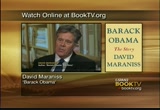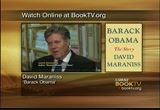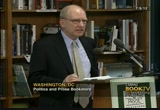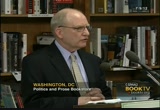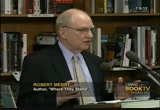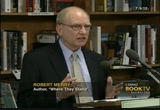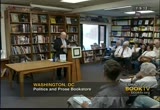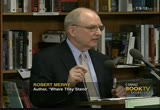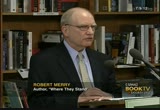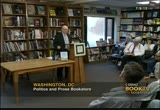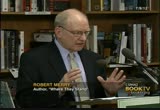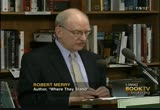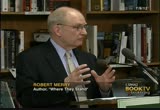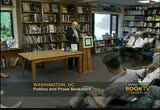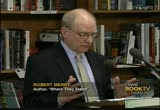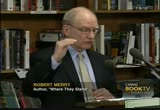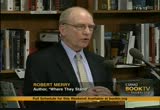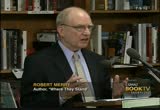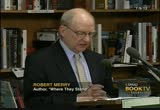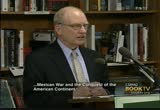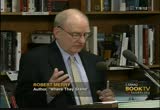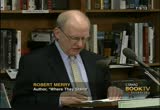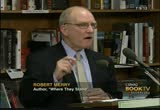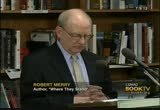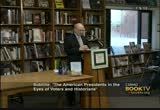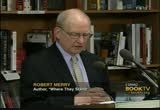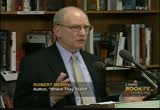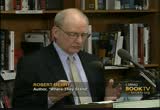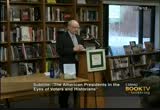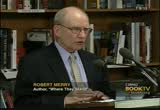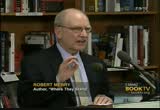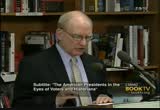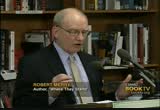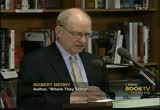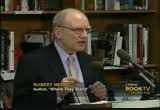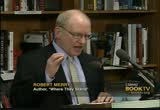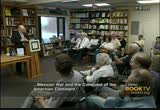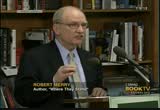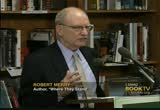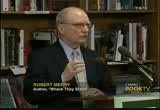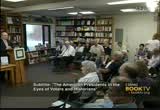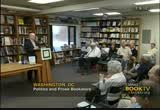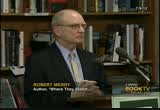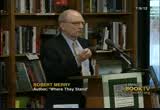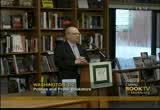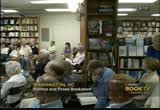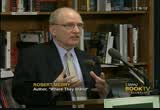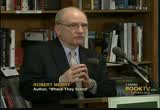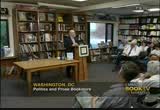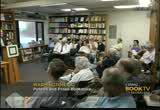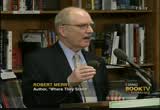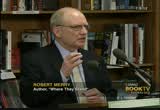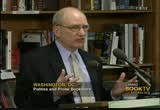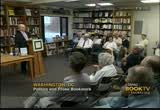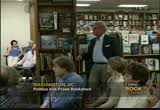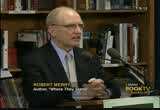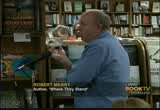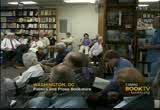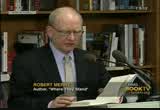tv Book TV CSPAN July 28, 2012 10:00am-11:00am EDT
10:00 am
.. they had that clash of old and new. for all of his youth and adolescence he was in a colonial country in a very poor part of the kenya, so he lived in the mud huts with cowles and no television and stuff like that. a century behind in some ways and get kenya was starting to emerge. the rebellion was beginning, the push for independence was beginning and the generalization he was a part of that. >> host: how long were you in kenya and what did you see? what was it like to be over there? >> guest: kenya was one of the great experiences of my life.
10:01 am
every day was unforgettable. we were there for about two >> coming up, trained or places the presidents and groups to better understand places in history from leaders to destiny to "split-decision presidents" who had a better first or second and "utter failures." this is about an hour. [applause] >> thank you. i have to say that it's always a great pleasure to be era politics & prose. i've done this on more than one occasion and i consider this a place to see a literary cathedral in washington insists
10:02 am
a real pleasure to be here. i will say i'm very pleased to see so many people year, although it gave me just a moment of nervousness because it looked like i was in going to go to find a parking spot and i was worried whether i was going to be here on time. it is an honor should be here, although i will have to say in a 365 day year there's 465 events at politics & prose. let me say my book really began with a phone call in early 2010 from an editor and a "new york times" op-ed page by the name of mark lotto, who has since moved on. he wanted to know whether he wanted to do a piece for the op-ed page on a statement that obama made to diane sawyer shortly before that, in which he was responding to be sides a little bit right here on the basis of some of the apparent unpopularity of his policies.
10:03 am
he said i'd be a really good one term president than a mediocre two term. he wanted to know if i wanted to write a piece of some of our really good one term president since i just recently come out with a history of the presidency of james k. polk, generally considered by presidents to be the best of our one term presidents. i said i'd like to take a different tack and compare history's judgment with the contemporaneous judgment of the electorate. this is something i've given some thought to and i got to the heart of what obama had to say and what occurred to me was a remarkable statement for a president to make. because he was saying he was willing to accept unpopularity to the point of voter rejection in favor of the esteem of history. my question i wanted to pursue in the op-ed he use was how realistic is this?
10:04 am
so i looked at history's judgment and as you heard, history's judgment is generally can tittered to be the judgment of the historians in the polls of the academics that we begin with arthur schlesinger junior's senior in 1948 in the pc did after a poll he took in life magazine insert a great deal of interest, showing the american people have a real fascination and affection really for their president the massive body of literature that's grown up as a result of those polls over time. so there's a generally recognized consensus on the part of historians and plenty of room for discussion about where so-and-so belongs, john adams, for example for grover cleveland. i'll talk about both momentarily but then the contemporaneous outlet draped. well, 82 term president is
10:05 am
obviously receives higher esteem on part of the electorate than a one term president. a two-term president succeeded by his own party, meaning that he had two terms that were judged by the voters to be worthy of detention on part of the party is another inbox at significance perhaps. what about midterm elections, the fate of the party, the incumbent party in the congressional elections midterm. what we see is a large correlation in which the assessment of his or retracts largely, in most instances with the assessment of the voters. in other words, seldom has history held the president rejected by the voters and seldom does history debunk a president who was hailed based on my indices by the voters. so the question posed by obama was skinny set himself up in
10:06 am
popular programs to such an extent that he gets tossed out by the electorate and stuck it high praise from the historians? what i wrote is there's almost no chance of this. it doesn't work that way generally speaking. but there are some interesting and intriguing exceptions. so having written that piece, i thought i would like to explore the exceptions it has perhaps this might be possible through this nature acts of the historians for the, the voters verdict, comparing them to look at the president's in terms of how president succeed and fail, how the presidency works, how we assess presidents to history. i was reminded of one of my favorite quotes from mark twain among many. it's difference of opinion. what occurred to me about that and i thought that was applicable here except for one significant thing.
10:07 am
the difference of opinion is that the finish line. there is no finish line. we can talk about this endlessly and that's why want to get through these remarks so we can get to the questions and discussion. so i begin with the disparities. there are some examples of offering up and talk about some of them, may be in the question-and-answer, but some in this talk. president said the voters and historians considered in a negative light grant, harding, coolidge. we could also include in that, i and reagan because especially eisenhower and reagan, but eisenhower came in after his presidency in the first poll after arthur schlesinger junior in 1962 with a terrible rating. he was merely down there with arthur -- [laughter]
10:08 am
and first johnson -- andrew johnson, chet arthur was a non-entity in and andrew johnson lost control of the government in a country he was supposed to leave. i thought that was remarkable that historians but eisenhower theater. almost immediately he began to rise at and is consistently in the near great category and reagan initially was down there. also right next door to chad arthur and he is moving up and hasn't reached the level, except in the most recent poll in 2005 by "the wall street journal." so what about the president's history lies at the voters didn't care for quite a while, one that i really have to talk about made me stirrups of energy in the room as wilson. the voters couldn't wait to get rid of that guy by the end of his second term. cleveland, john anna's and harry
10:09 am
chernin. harry truman as a fascinating point. he personifies a significant element of this whole dang in terms of how the voters judge and how the historians judge the president the is totally different. historians like at a full tenure in office, whatever that might be. two terms, one term, and look at what he's accomplished and say good and not so good, terrible, whatever and rate them accordingly. the voters look at their president says they were invited to by the constitution in four year increments. these guys, you, we are pioneering in firing of these guys to be taken very seriously and that is why we judge them exclusively on four year increments and with not much sentimentality we just move on.
10:10 am
so let's look at the presidents that consistently have been considered denying creates or near greece by historians. and there's a pretty much consensus here. number one islington, washington, fdr, almost always in that order that jefferson, jackson, polk, theodore roosevelt, wilson and truman. interesting here, all except for pope. but polk is the exception that proves the rule if there is such a thing as an exception because he's the only president to ever ran on a one term promise. he told the american people if i'm elected i will only serve one term and he kept that promise and no one else has done that. so all eight sought reelection, got it from all but two of those were succeeded by their own party, which as i say is the highest electoral discussion, acceptance being wilson and
10:11 am
truman. so history of the electorate are in sync here. let's look at those judged by history to be presidential failures buchanan, my least favorite president. i think he was a man of very low character. pure strength to match and was not much better than buchanan. andrew johnson as i say, lost control of the government. he can't control the government for whatever reason. fillmore. i'm not sure i necessarily think selmer should be a total failure. and then of course departure from the white house, richard nixon which i'm not going to get into here, but maybe q&a about what do we do about it president who is so ignominiously humiliated and accomplish some
10:12 am
very significant things before all that happened. a guy in that category to a lesser sleep accent is lyndon johnson who had massive accomplishments and then basically brought himself down through his vietnam. so let's talk about grant. i seem to have lost my place. so all of these guys that are the so-called failures are one term as except for nixon and except for the one outlier besides nixon and that his career. grant is considered a failure, although he's rising in the information of history. it's a two-term president and
10:13 am
now he gets a little complicated because he was succeeded by his own party in 1876, only as a result of corrupt manipulation of the electoral college by the republicans who are able to do that because they had occupied the south. grant's first term was a clear success, not a huge success, but indubitably a success characterized by an economic boom of robo construction. the voters have no reason based on the economy. the second term however was characterized by nasty financial scandals involving white house and cabinet officials including friends of the president who didn't seem to take any serious perhaps they should. there was an economic downturn we didn't seek to attack because it was his philosophy. his second term is much less successful and republican
10:14 am
should've lost and would have lost had it not been for those manipulations. if you take the two together, i don't quite see how you can judge greer to be a failure. sean boleyn said princeton, very prodigious scholar of our time, presidential scholar among other things has written in a "new york times" op-ed that grant is rising in the estimation history and will continue to rise and he's probably right. so let's get back to harry truman and not point out was making earlier about the differential between how the voters assess the presidents. you have to love harry truman. he's such a simple guide and made such simple, strong decisions and cut away all the chat. and as i say, history regarded him from the very beginning, the first poll after his presidency
10:15 am
in the near great category never fall. at the voters grew tired. he had in his last full year in office, 1948a g-golf approval rating of 22%. almost can't get below that. i think maybe george w. bush at one point came close. so how do we square the historians immediately in your great category where is the voters were essentially saying he's ineligible for rehire? well, history is looking at the overall record, which is highly accessible. i would say her road trip you look at first term because he made the agonizing decision to save nearly american lines. he presided over america's role in fostering the united nations. he was the president under containment which saved western europe from soviet aggression
10:16 am
also miss him that was poised with 1.3 million troops. he frosted the market plan, brought about the national security act of 1947 and created the defense department and other things. he successfully made it transition from the wartime economy and he made the momentous decision to read about how we made the decision and all the adviser said you can't say. you'll have to get country and give up on berlin. absolutely heroic. all that i just described happen in the first term. the second term was really quite mediocre. he didn't manage to maintain what i call longevity of success, which is a frosty record, a frosty performance to a full year for whatever time you have. he had a couple of notable achievements. nato is in the second term in
10:17 am
the korean war under macarthur of his second term, but a sputtering economy throughout the entire four years. he ended up with the stalemated war that he couldn't win and get out of, which was political poison for any president. a series of scandals involving presidential cronies that he brought to washington from kansas city in white house and around the government that they were really not qualified for and they abused their offices and and one could argue that he brought about -- invited the korean war to some extent a leading the nation's military guard down. they essentially signaled to him that there wasn't any point in trying to get the nomination and democrats were talks to in 1852 when eisenhower came in. so in my view, history of the voters both had it right, even though they look at the president from two totally different days.
10:18 am
a couple examples from history was too generous. this is all subject to mark drains the gem about difference of opinion making horse races. jon knott of grover cleveland. now my favorite example. in the first academic poll by arthur jess leger, cleveland the spring eight and john adams is ranked ninth. not cleveland as we all know -- we don't know much about cleveland. i did before i started to be honest with you. i know enough to be able to talk about a little bit. what we know about it is he's the only president to serve two nonconsecutive terms. what is known as after each of those terms his party was tossed out of the white house. the first time as him on the ticket and the second time after his party he basically said we don't want you on the ticket, but the voters still tossed out
10:19 am
the democrat under william jennings bryan brotman william kennelly. so he's really the only two time one term president in our history. so my question is, how in the world if you think the voters are not totally, how the world can he be considered number eight? i didn't think he should be down there in 27, but it seems a little rich for me. so let's look at it. his first defeat in 1888 won the popular vote, the los angeles actual college. probably not exemplary term. interstate commerce act was passed, which brought control to the railroad trust and it was an important piece of legislation, and so he didn't get credit.
10:20 am
he curved the abuses in the civil war pension disability programs that have become very, very serious. but he presided over extensive labor unrest stirring has time that led to a lot of of demonstrations, riots and deaths, it a lot of bloodshed, significant loss of life and property damage and just like an intractable war that a president can't get out of, blood in the streets is a political poison for a sitting president. he failed to reduce tariffs, which he promised he was going to do. so his state was written in map record. second term as a clear failure, characterized by persistent economic downturn, extensive bank failures, texas devastation and in an art response on the part of the president.
10:21 am
so i would say that overall his record is middling at best and the voters probably had it right, i think maybe historians for a little bit off the mark on that one. now historians can be influenced by various things. allan nevins, one of the premier historians at this time wrote a two volume biography of grover cleveland called grover cleveland, the study encourage, two volumes, more than you want to read about the guy. my next project is actually the 1890s when william mckinley for a hatchery as of this volumes that i'm not sure that i'm looking forward to it, but allan nevins is a beautiful writer, so i'm sure it's going to be a wonderful boat, wonderful biography.
10:22 am
probably the influence of allan nevins on his colleagues in florence i rating and cleveland has trickled down since then, but he still rather high on 12, 13, 14. let's talk about john not dems. obviously a great man, great patriot and contributor to our nation. he's not a great president and i don't hankies and near great president. he provided use of commercial shipping that got to be a problematical. he signed and fostered the alien sedition acts, which criminalize public criticism of the government and use the sedition act to root out in the grades that were potentially hostile to federalist sensibilities and that will go back today. there's a story of one french bookstore owner who moved here
10:23 am
quietly running the bookstore in philadelphia and ended up being singled out for deportation. a friend had some connections in washington. why me? why am i being singled out? the guy made some inquiries and reported back that the president said nothing in particular, but these two french. he presided over massive tax increases, which led the economy to begin stuttering, so the voters in 1800 display sent them packing and i think they have it right. there's a collective judgment, maybe even collective wisdom. they have four years to sue over it and then take another action and that's what they do.
10:24 am
so both cleveland and not insisting ranking shifts since 1948, but they are still rather high. so we are on a roll here, so let's see if i can toss in a few more before we get to questions. let's talk about warren g harding, a total failure by historians. now we all recall elected in 1920, died in office, was a passive chief executive and the view generally as a kind of vacuous pseudo-close to his career was filled primarily by the fact that he looked precisely, what people thought a president should look like. so people of course had been in his time and later when they've read about them shake their head at the 15 year affair he had with kerry phillips who have been to be his closest friends wife and they would snicker at this sort of vision of the tryst he had with the starry eyed
10:25 am
women who is 31 years his junior and congress at the national agenda, all true. and finally interrupted after he died in office, but nevertheless harmed his reputation because they were of those trials of the century and it really just eroded his standing. arthur/jerry junior said he was more careless. he was overly protective of people he should have been her carefully. and always knew how to just capture these things is that hurting is bad man. he was just a slob. [laughter] to listen to this. he was never implicated in a scandal. in fact, smalltime newspaper and a small town in ohio and never
10:26 am
use a government at any point to enhance his newspaper business, unlike lyndon johnson, for example, who'd used his rich friends to get into the television business, very lucrative, which he did under his wife's name and became very rich in the process. harding never did anything like that. nothing bad ever happened. he didn't get in any intractable wars. he got into the economic depression and then presided over an extremely robust economy, including in 1922 and 14% gdp growth rate, which president obama could use right now and social unrest, which has been really percolating under will send for many reasons that i believe are attributable to wilson's decision-making declined rather significantly. so you could say that this guy, harding notwithstanding his week assists and liabilities was
10:27 am
selected to nullified by the electorate ever felt that mandate and if so, maybe that's not such a terrible record. so what is a terrible record? now we've come to where i'm really hoping ms or things up a bit here. woodrow wilson got his first term as a clear success, now looking as voters do, but a modest proportion. he enacted productions which democrat did in those days. he initiate banking reform, created the federal reserve, very significant. he brought about the antitrust act, anti-monopoly legislation, which is needed and overcame economic difficulties that emerged in this presidency and overcame them before his election and most significantly slogan for reelection. and promptly renew for by
10:28 am
manipulating the trial issue in ways that favor scrape written over germany, william jennings bryan if you have a warrior gets stuck into the war and will send less than and resigned over it. he wanted to get into the war for various reasons which we don't need to get in to and get into this overarching visionary views about how the world could be transformed through his particular brilliant view of the world. and he also, very unwisely allowed himself to transform american domestic society were nationalized, military draft obviously, very, very
10:29 am
significantly happened. the gdp drops 5% and an extra 6% for significant suppression under his attorney general palmer became infamous with urban riots that erupted in the war never yielded what he promised. by 1920, the american people were saying there's got to get rid of this guy. and i'll just say as a side, he was a sanctimonious man. and you know, they have been john quincy adams, james k. polk, quincy adams a a one term or, jim's james polk a polk a one term or by choice, but by themselves much more difficult -- political difficulties during his one term in office than is needed.
10:30 am
june carter in my view of george w. bush and i don't think that hope any of those presidents. but historians consistently have rated both the next consistently for near great category. and voters as i may have a totally different view of them. so let's talk briefly about when the voters and historians converge and a converge on the greatest of the great company and i called leaders of destiny. i have three criteria for those presidents that we put in the category of liters of destiny. these assessments are valid and of themselves not necessarily complete however. consistently high ranking historian polls, and then consistently or high ranking in terms of the voters, to terms by their own party and a third test that i apply presidency transfer
10:31 am
of the country's political landscape on a new course. this is very difficult to do for a two-term president and a two-term president elected twice and succeeded. and there's 12. so who are these greatest of the great man of destiny? there's six of them according to base criteria. well, the suspense is killing me, so let's get to it here. washington and order of service, jefferson, jackson, lincoln. fdr. washington said it all in motion into the really ugly through judicious decision-making and will relinquish power at an appropriate time, which is a marvelous contribution to his nation. jefferson obliterated the effort
10:32 am
to craft an american aristocracy and establish small government eats us as a political sense ability in america. jacks and faster i select trick, since dean to palladian in american politics in the west as he was emerging. the western states -- new state spending property requirements for voting and also popularly of the electors but then elect to the president. so the voters were invited in to the election process in a way they hadn't been before and in a way that hamilton in federalist at one and to be in jackson faster send created a mass elect trait and galvanized what i call conservative populists and and dominant political voice in america for 25 years. lincoln will not save the union, freed the slaves enough for anybody but also turned the republican party into an agency of industrialization, which had to be done, had to be controlled and monitored and direct it and
10:33 am
the republican party did that. but then over time the abuses of that system emerged ntr, teddy roosevelt brought for us curbing those abuses of the industrial age and set the country on a new course and finally fdr saved the democratic capitalism by the agonies of the great depression and in so doing transformed america. having done that transformed the world. so that is quite a remarkable record. so why were calling about these men of destiny. first, what can we say about these people? some would call liberal, i think the main point to the side with these men of destiny is the american people are fired and
10:34 am
hired president of liberal presidents and they're not really ideologically formulated in their thinking, they are formulated on performance and that's what i believe the presidential election, even our slip into the day are largely referendum. if they are not happy with an income income militias say jimmy carter was not particularly liberal as a democrat, but was far more liberal than any republican in recent memory from that time i turn to the other guy, even though he was considered by many to be far more conservative than the american people. one proviso when you do this in these referendums. this got to work. four years to prove. if you don't make it, that's the end of you. and if you're presidency that is to say. at the end of destiny are that
10:35 am
they understood their time. states may determine the character of his time, he will fail. they'll understood what was happening as i mentioned about jackson. lincoln when he set a house divided against itself cannot stand. but he was saying was essentially everyone else was trying to prop up a divided house in lincoln cut through all of that with this idiom to show the country had to move in any direction and they all understood the character of their time. the allegation. they all had to envision the new country, new direction they wanted to move the nation toward. they all had this day, complex quality that's political greatness to get your hands on the levers of power. it's not designed to be easy, but to get your hands on the levers of power in direct them in such a way to move the
10:36 am
country towards that vision and all six have it. and now we come to ronald reagan. i think he did in fact transform the political and you can set the country on a new course. he was certainly -- he meets a voter test because he was a two-term president succeeded by his own party. he's not consistently elevated in the polls, although as i note he is going rather sit intricately and i think he's probably going to get there. by my standards, my criteria he probably will be there. so was the underlying theme of all of this? the presidency is an amazing and dictation. its power emanates from the people who own the office and that is why they take it so seriously. and this and does the opposite that are both political force. but it also has multiple curtailments because well he speaks for all the people coming yesterday with other politicians
10:37 am
who speak for smaller constituencies and speak for those constituencies very forcefully to not be intimidated by this guy just because he speaks for the rest of the country unless the president can force that agency and to sub in that they have to listen to. and the result is that it's very difficult to be successful and the leaders of destiny only emerged in the country needs them and is hungry for a new direction. the countries and not situation right now. all in the two quotes soundness of. wilson said that they president rightly interprets company is irresistible. that is true. that's not that easy to do so consider another quote from our friend, harry s. truman when he was drinking with his pals in the one afternoon.
10:38 am
he is to go up there because he missed those days so much and stared into his bourbon glass and grout, you talk about the power of the president to see how i can push a button and get things done. i spend most of my time kissing somebody fast. wow, those two quotes really represent how works the night and that is a marvelous institution. and as they say, is a pleasure being here talking about the marvelous institution and with that i'd be happy to take any questions and know to please go to the microphone. [applause] >> thank you for talkative finisher but this morning i could verify everything you said is pretty much in there. dave price, retiree.
10:39 am
first about the book, very limited mention of john kennedy, but more so than some of the others. is that deliberate on your part? second question but v., given kind of the new media, which we have now, teasing that will have any and i, for example, you think of atoms, imagine what we shall not know to with that now saying abraham lincoln may not have even become president because of the squeaky voice and his looks. but here's your thoughts are not. second would be where do we go from here quiets >> i was taking the task on that because one reviewer who noted some of his accomplishments, i actually think that i'm probably right, although i felt somewhat chastised by that by a very
10:40 am
prominent historian who suggested that. i think kennedy might've been a good president. he was in great political when he was killed, but we simply cannot know so i just basically put it aside as kind of an unknowable. the nature of the new media, social media and impact on politics, boy it is clearly having a huge act on politics. will it be wrote the paradigm that i'm talking about, historical paradigm of how politics works, how presidential elections are referendums? i don't know. i worry about that a little bit. i would like to think not, the american people will continue to sift through and cut out the chaff to get to the heart of things. but as i see what is happening in the media, i am not absolutely sanguine about that. >> hi, my name is smith.
10:41 am
i guess i'll take your bait on woodrow wilson. i hesitate to do that because you must know a lot more about him than i do. >> mark twain said let's have a worse race. >> getting into world war i, do you feel there were any -- where is there not some positive outcome locally speaking at least from the u.s. being in world war i? is that not an accomplishment to be able to bring the country into the war? what would've happened had he not done not? >> well, i guess let's take a
10:42 am
look at what he happened to your doctor he did that it would have been to europe was absolutely disastrous. i believe another historian -- historians have debated this for a long time and it's a legitimate point either way. but i happen to believe that wilsons, getting into the water, breaking a stalemate based on promises to combatants and then being unable to preserve those promises to the point that germany was totally humiliated, that basically led the way to hitler and i think there's been a negotiated settlement, i think most likely things wouldn't have emerged the way they did in a tragic way they did. so you can argue that's a very tenuous connection, but my study of that. indicates that is very likely to have been what really happened.
10:43 am
>> okay, thank you. >> good evening. sir jane foster. another question about woodrow wilson. was nt with the one who was deathly so? and pretty much his wife was running game. what kind of effect would you say this is pat on historians of voters reactions to opinions on everything? >> well, you two strokes. one most likely in paris during the verse five peace treaty negotiations and yet another much larger stroke they came close to debilitating him while he was campaigning on behalf of league of nations, which was the only thing left from the verse i
10:44 am
negotiations that he sort of went there to get and he was adamant he was going to do everything possible to get america into the league of nations. and he had the stroke in the middle of that. very dramatic. something happened at that point that couldn't happen today. that was that the magnitude of this infirmity was kept from the american people. the people around wilson and his wife, essentially managed the country without letting the country know that this is what it happened to their president. that was very unfortunate turn of event centers to stand and it can't happen today because we actually have a constitutional amend and design to allow for the peaceful -- temporary peace of power. >> so you're saying it would not name all that much say in how no one really knew that much about
10:45 am
it here at the innocuous sort of the end of the second term anyway. >> i caught an interesting charlie rose the other evening. i think yours are rerun panel. i forget whether you are on it, disgusting various aspects of the presidency, including the issue of terms another most presidents served second term of their performance accomplishments in the second term. so i'd like your thoughts on that and one thing that truly puzzled me was that abraham lincoln was an exception to the ascendant seems to be me you stared hardly any of the second term. so i don't know whether she misspoke or whether she was -- i'm curious as to what she might've been getting out.
10:46 am
>> i was asked the other morning if i could think of any other president whose term was more sterling than his first term and i could come up with one. i think there's something that i called longevity. the president has the greatest longevity of success, the only president to dare to run more than twice a night you can't because of the 22nd amendment, which i'm opposed to. but longevity of success basically means that you manage to maintain the country and run the country without some combination of economic dislocation, dislocation in the streets at the of some kind that lead to violent, a war you can't get out of him can't win, a scandal. all of these things are part of
10:47 am
life, aren't they? because they're very difficult to maintain stability throughout. so eight years as a long time to maintain stability and you begin to be the frame of leadership in the second term and we certainly saw that with reagan, certainly thought was george w. bush. i think that we saw it -- i think bill clinton's second term was in some ways better than his first term if you boot the first two years which are to be considered a failure by the electric dander because every time you had your head handed to you, you're basically not doing that the voters want you to do. it aside from that scandal and what other thing i say about bill clinton is that he was reluctant to invest political capital, accumulated political capital because he buried really only crafted a centerleft mode of governing that the country
10:48 am
was very comfortable with and used that to run the country by the fact to play. then he did really tried to use the political capital for any major initiatives in the result was we ended up being a good president and not a great president and that was an unfortunate scandal. what the republicans did on impeachment i consider monumentally from a political standpoint. many, many americans are uncomfortable to have been the caught in that scandal. [inaudible] >> one of my regrets while living in washington is i never got down the uva to have autographs his life of jefferson and for the family -- her family can't see. have a favorite to her feet? >> i'm not sure that i do. it might be the biography of
10:49 am
two-volume is consolidated into one of andrew jackson. i think that may be my favorite. >> hi, my name is pat and i'm a social studies teacher here in 10. i just want to know your odds as we talk about two terms. what is your odds on a one six-year term? it seems to mean as we watch this campaign unfold the millions and millions of dollars being spent. secondly, the fact that the incumbent president and his first term means to start campaigning almost two years before the actual election. what are your thoughts on not clacked >> i am not enamored of the idea of the six-year term about cellulite.
10:50 am
first of all, the fathers really grappled with this and it's fascinating. they grappled with the whole question of executive power. one of the biggest conundrums they had to grapple with and they kept putting it off because they couldn't quite figure out. they knew they were against unchecked executive power and you had alexander hamilton give a five-hour speech at the constitutional convention and in the species that among other things talking extensively about the president, the governor. he wanted the governor to be elected by the people from each state and those a lot tears and his view should be elected by the people could muster was democratic in that sense, but then he wanted the script to serve life. he actually said the british system is the most fantastic cover the most perfect system by the mind of man and be as close as possible, so he wants some unelected bennies can come as three guys and we have another
10:51 am
election. then he also wanted him to house absolute veto power, meaning he could reject anything congress does. that is one point of view, which is that totally responding to your question, but i'm getting there. then there was roger sherman, i believe, to basically one of the president to be no more than the handmaiden of congress that he would be like to buy congress and you would have very little powers, no independent power base and he would be just there to execute the laws that congress would match. cuc really two very polar opposite point of view about executive power. the delegates are heading towards a shared and viewed the images via handmaiden of the
10:52 am
congress and they weren't totally comfortable with that because they were -- they couldn't see how there could be a check on congress and there could be abusive congressional or legislative authority just as much as executive, so they sent a cable make it six years or seven years. he can't get you reelected because if he could congress would run all over would have any independence whatsoever. it wasn't until governor morrison james mattis and finally cracked this idea of the independent president to use go to the american people independently. now why do i need to go all that long to get to this question? because i believe that a four year term offers tremendous stability because the american role can feel very comfortable about assessing a president after four years. he said for years. you don't have to be accountable whether he's had an adequate
10:53 am
opportunity to show us what he can do. and secondly in this referendum presidential politics come you don't have to worry about the guy in the wings. he's only got four years. how much damage can he do? suppose it was six years and after a year you realize this guy was incompetent or worse. you've got five years. that will generate civic anxiety, which can be destabilizing. i think before your term term -- i equate it -- pardon me for going into the analogies in the book. i got slammed by reviewer on amazon about this, but i kind of compare it to 90 feet between bases in baseball. that gives equilibrium because all of the talent, running, throwing bat speed, and that coordination, reaction times are all in the librium at 90 feet. if it were 85 feet it would work. before your term in my view is
10:54 am
sort of like that. [inaudible] >> i never believed i would be saying this in public, but i wonder if you are under reading again a bit, particularly his second term. i know there've is the iran-contra, but when you think of the tax reform, which was major, and then the whole cold war and the whole way he had shoulder stowaways gorbachev and the soviets seemed like a major accomplishment. the second question about reagan on this media age, how do we learn that we did not know about about how badly off uis with gw after he got gw hospital after he got shot and potential for manipulation, color which you want unpresidential help is about as bad now as it was when woodrow wilson was president. >> they certainly try to keep it
10:55 am
quiet. >> are you saying you think reagan's second term might've been better than his first term? >> i just think it was pretty substantial and that's what historians are pushing it out, plus the other criterion of getting h.w. elected in its wake. >> i think you make a very good point. i think reagan is going to be included in the leaders of this to me as i say. he is headed that direction and i believe that he is a very consequential president. either the two greatest of the 20th century were franklin roosevelt and ronald reagan and one was probably the most liberal and the other was most conservative of the century. on the question of the secrecy of his house, but the very, very good point, mike. it did come out that during his presidency. they were unable to bury it until history got a hold of it.
10:56 am
it had gotten a hold of by journalists on and i think that indicates things were a little bit different than they might have been, but your point is very well taken. >> one last question. >> i respect what you're doing. i just have this feeling that certainly you know much more than i do, but i have this feeling that this is such a calm? topic because i think each president is a product of their particular time in history. and you know, to go back to john f. kennedy while i believe he was far from a perfect president, you know, i saw chris mathews the other night or whatever it was. and you know, basically he said that he saved the world, you know, from the brink of nuclear
10:57 am
destruction and i often wonder if 9/11 didn't happen, what president bush had just stayed down on the ranch for four years and rode around on a horse or some thing and that would've been at? i mean, i think it's just a really, really difficult topic to quantity and user baseball analogy. viciously, who's the greatest first baseman of all time? i mean, i think it's hired -- it is hard to really say because of the error of which they played. and while i certainly, you know, it is a topic of great interest, i think that there is a lot
10:58 am
involved and it's really difficult in my opinion. ivanv asked a question. >> i think you did. it's embedded in there. i take your point and many historians have made the point that you really can't compare and from the 1840s, for example, with the president from 2000. that may be right. i'm not really trying to make any definitive statements about these guys. i am just trying to play the game. i am just trying to engage american voters than american citizens and the discussion about their president. so i don't normally do readings, but just by way of summing up perhaps, i will just pick one little section that towards the end of the induction were in trying to explain what i am up to here.
10:59 am
so i write, and embarking upon the expiration of the presidency i confess to an prejudice and consider the institution a work of genius, contained within it armed struggle, penetrating political analysis and the so-called endeavor all came together by accident during the miraculous building session in philadelphia during the hot summer of 1787. both george washington and james madison used the word urkel to describe the outcome. it is a surprise in the american people take a view of their presidential office to an appropriate degree of dignity and success. it is difficult for us today with 225 years of constitutional history to conceive what a remarkably innovative and novel idea of the presidential idea was. the great ideas l'enfant but in the 18th century, they were in their heyday and it wasn't clear in their president could rival the world's royalty and
148 Views
IN COLLECTIONS
CSPAN2 Television Archive
Television Archive  Television Archive News Search Service
Television Archive News Search Service 
Uploaded by TV Archive on

 Live Music Archive
Live Music Archive Librivox Free Audio
Librivox Free Audio Metropolitan Museum
Metropolitan Museum Cleveland Museum of Art
Cleveland Museum of Art Internet Arcade
Internet Arcade Console Living Room
Console Living Room Books to Borrow
Books to Borrow Open Library
Open Library TV News
TV News Understanding 9/11
Understanding 9/11